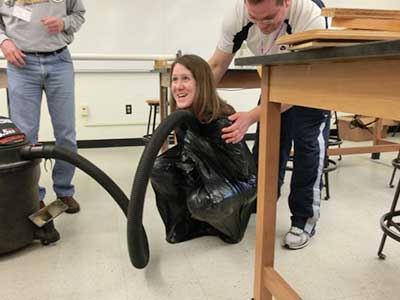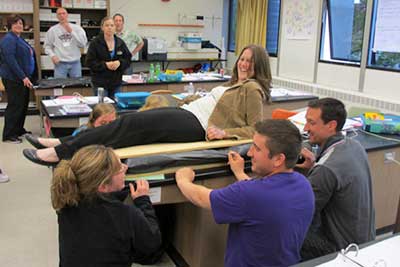Mentoring Future Physics Teachers at the University of Wisconsin – La Crosse
Jennifer L. Docktor, University of Wisconsin – La Crosse

Jennifer Docktor gets "vacuum sealed" inside a trash bag during a demonstration on pressure.

Area teachers attempt to make Jennifer Docktor "rise up" using air pressure during a professional development workshop.
College is a time for making decisions. These decisions shape the course of a student’s career path, such as what to pick for a major and whether or not to change that major along the way. Students rely on advice from a variety of mentors throughout this process including their parents, families, friends, and also their faculty instructors. College is also a time when students build relationships and acquire the skills and resources necessary to be successful when they transition into their chosen career. This is especially true for future teachers.
In addition to teaching physics courses, my role at the University of Wisconsin – La Crosse (UWL) includes working closely with future physics teachers. I have found that this mentoring role is multifaceted, including advising students on coursework, providing them with opportunities for early teaching experiences, instructing them on physics curricula and pedagogy, and offering them resources and feedback when I observe them teach in local schools. Mentoring also extends beyond graduation through e-mail contact and professional development workshops for in-service teachers. In the sections that follow, I describe each of these mentoring roles in more detail.
My first mentoring role is as an academic adviser. Most students who decide to pursue physics teaching at UWL do not declare a major in physics education when they enter as freshmen. To encourage them to think about this possibility, I give an annual talk at the freshmen physics majors’ seminar about Why you should teach high school physics! This establishes me as a point-of-contact for questions related to the secondary teacher education program in physics, and then I meet individually with students who are interested in learning more. UWL also has a supportive departmental culture where teaching is viewed as a valuable career. My faculty colleagues help to identify students who show some interest in teaching and encourage them to meet with me. Once a student formally commits to being a physics education major, I am assigned as his/her academic advisor, and we have follow-up meetings a minimum of once a semester. Although these meetings are primarily focused on mapping out a sequence of courses for the upcoming semesters, they often lead to more general conversations about life events.
My second mentoring role is as an outreach experience coordinator. Although I don’t formally hold this title, I am frequently contacted by local schools or institutions who are seeking volunteers for upcoming events, such as judges for science fairs, coaches for robotics tournaments, or counselors for summer science camps. I also occasionally receive requests from local teachers to coordinate a demonstration show or physics fair event for K-12 students. In addition, the Physics Department also has a partnership with the local children’s museum to coordinate demonstrations during some of their STEM-focused events. These are all excellent opportunities for physics majors and physics education majors to acquire early experiences teaching youth, which can spark (or confirm) their interest in teaching.
My third mentoring role is as a pedagogy instructor. Although UWL doesn’t have a physics-specific pedagogy course, our science methods course, Teaching and Learning Science in the Secondary School, is co-taught by faculty specializing in physics education, biology education, and chemistry education. In addition, we developed a new course on Curriculum and Assessment in Math and Science in which students complete projects and receive feedback from content specialists. For example, in one project future science teachers are paired with future math teachers to design and teach an interdisciplinary lesson based on national standards. I also actively recruit students who are interested in teaching to assist me with a course I teach on physical science for elementary and middle education majors, where we engage in pedagogical techniques for teaching science. Finally, I encourage future physics teachers to do an independent study or conduct physics education research with me for course credit, which allows them to explore research-based curricula and instructional strategies in more depth (such as research on teaching problem solving).
My fourth mentoring role is as a field supervisor. At UWL secondary education students complete two classroom field experiences prior to student teaching: one in a middle school and one in a high school. Faculty work with the School of Education’s Office of Field Experience to carefully select school sites and mentor teachers for these experiences. As a supervisor, I visit science students during their classroom experiences and student teaching to observe them teach and to provide written and verbal feedback on their progress. I also help to facilitate a mentoring relationship between the student and their cooperating teacher.
My fifth mentoring role is as a workshop leader. I continue to serve as a resource for graduates and practicing teachers by coordinating and leading professional development workshops, either through grant-based programs (such as a Mathematics and Science Partnerships grant) or at the request of local school districts. Recent examples include sessions on the Next Generation Science Standards for the La Crosse school district and a session on teaching science with technology. I have found these workshops help to further develop partnerships with K-12 schools and teachers.
As I’ve discussed here, mentoring future physics teachers can take a variety of different forms. Ultimately, I think effective mentoring boils down to the following: fostering a community environment where students are comfortable seeking your advice and making a commitment to invest your time in their preparation. I encourage all physicists to consider their role in physics teacher recruitment, preparation and mentoring, and the widespread impact this has on future generations of students.
Jennifer Docktor is an Assistant Professor in the Physics Department at the University of Wisconsin – La Crosse. She specializes in Physics Education Research in the areas of problem solving and teacher education.
Disclaimer – The articles and opinion pieces found in this issue of the APS Forum on Education Newsletter are not peer refereed and represent solely the views of the authors and not necessarily the views of the APS.
